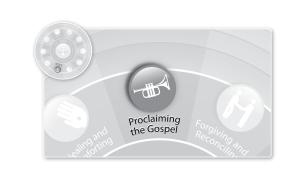 It’s interesting that in Luke 15:10, Jesus says that it is in the repentance of one sinner that heaven rejoices. He doesn’t say the belief of one sinner prompts rejoicing, not because repentance is more important or necessary than belief, but because as Paul notes in 2 Corinthians 7:10, “Godly sorrow brings repentance that leads to salvation.” Or, to put it differently, properly understood, repentance and belief both appear in seed form in the same seed.
It’s interesting that in Luke 15:10, Jesus says that it is in the repentance of one sinner that heaven rejoices. He doesn’t say the belief of one sinner prompts rejoicing, not because repentance is more important or necessary than belief, but because as Paul notes in 2 Corinthians 7:10, “Godly sorrow brings repentance that leads to salvation.” Or, to put it differently, properly understood, repentance and belief both appear in seed form in the same seed.
And by repentance we mean something more than feeling sorry for how messed up things are. As Thomas Oden says, “Though the English word repentance carries the nuance of sorrow for what one has done, it does not as adequately imply reformation of character as does the Greek. Hence it is a less powerful term than metanoia [the Greek word for “repentance”], which implies a fundamental behavioral reversal (Matt. 3:8; Acts 26:20; Heb. 6:1,6). Metanoia denotes a sweeping change of mind and heart followed by a behavioral reformation of a sinful life, a sorrowing for sin so as to forsake sin altogether” (Oden, 567). It would be a mistake to ask if repentance is “necessary” for salvation like faith is. It would be better to ask: What in the world would authentic faith look like if it didn’t come accompanied by genuine repentance?
One way of thinking about it is that repentance is how God involves our whole self in the process of new birth. Our spirit is enlivened. Even our bodies get into the act in baptism. And when it comes to repentance, every part of our soul—mind, will, and emotion—will be involved if the repentance is really prompted by the Holy Spirit. Oden puts it this way:
The reversal does not occur without first a change of mind, a revised conception of oneself, utilizing one’s own best moral reasoning to recognize the intolerable cost of sin. But where the reversal touches only the mind but not the heart and will, the despair of sin deepens.
Repentance requires a change of heart, a deep sorrowing for sin, aware that sin, whether personal or social, is in fact sin against God who gives humans freedom (Ps. 51:4). Far more than a mode of analytical reasoning, repentance is a deeply felt remorse and emotively experienced regret over wrongs done voluntarily against others, offending one’s own integrity and dignity and finally offending God.
Repentance requires a change of will, a redirected disposition to seek a new life of forgiveness and grateful responsibility. This reversal is not fully accounted for as an act of knowing or feeling. It is a grace-enabled act of volition, a determination to turn the whole self around (Oden, 568).
That’s why the typical “admit that you’re a sinner” doesn’t get at the fullness of what the Scripture is talking about. Oden calls repentance “a radical act of self-examination reaching into every chamber of the house of willed experience” (Oden, 572). The Holy Spirit is working in your brain, your will, and your emotions—and that typically takes some time. That’s why in the early church they didn’t have a habit of rushing people into the Christian life after a quick prayer, no matter how deep and sincere they seemed. Sin can deceive you for a long time, even when you’ve resolved to follow Christ. That year of preparation and searching self-examination under the guidance of mature Christian brothers and sisters was a crucial part of making it so when, as part of their public baptism, they confessed Christ and renounced sin, they were striking at the root of evil in their lives, not “trimming leaves one at a time” (Oden, 575).
Oh—and speaking of confession, we need to note a very important truth about that in our next post: If we want to reform our proclamation of the gospel, we need to remember that Christians are only ever as strong as their two-pronged confession.











Great article!